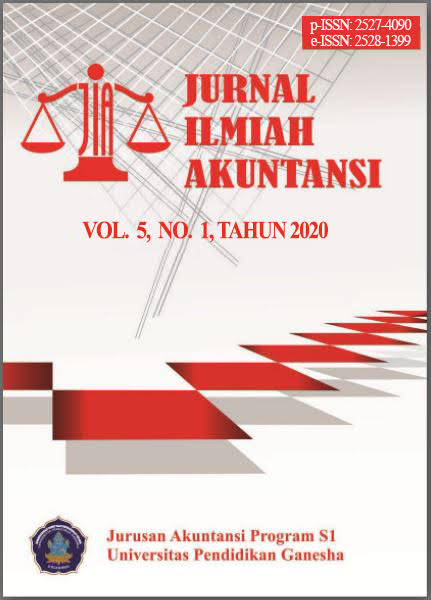Pengaruh Jalur Pelaporan dan Komitmen Religius terhadap Niat Melakukan Whistleblowing: Sebuah Studi Eksperimen
DOI:
https://doi.org/10.23887/jia.v5i1.24289Abstract
Whistleblowing is considered as one of the effective ways in preventing and detecting fraud. This study aims to examine the effect of reporting channels and religius commitment on the whistleblowing intention. To achieve this goal, study participants acted as company staff in a case of fraud. This study uses a 2x2 between-subject design which involved 100 participants. As predicted, the results of the study showed that individual's intention to whistleblowing was higher on anonymous reporting channels than non-anonymous. However, in contrast to predictions, this study found there is no difference in whistleblowing intention based on the level of religius commitment. This finding implies that the existence of anonim reporting channels may trigger individual to do whistleblowing.References
Abdilla, Z. F. N. (2017). Pengaruh Gender, Religiusitas dan Retaliasi terhadap Intensi Melakukan Whistleblowing (Studi Empiris pada Badan Pengawasan Keuangan dan Pembangunan Perwakilan D.I. Yogyakarta). Universitas Muhammadiyah Yogyakarta.
Ajzen, I. (1991). The Theory of Planned Behavior. Organizational Behavior and Human Decision Processes, 50(2), 179–211.
Alleyne, P., Devonish, D., Allman, J., Charles-soverall, W., & Marshall, A. Y. (2010). Measuring Ethical Perceptions and Intentions Among Undergraduate Students in Barbados. The Journal of American Academy of Business, Cambridge, 15(2), 319–326.
Association of Certified Fraud Examiners. (2016). Report To the Nations on Occupational Fraud and Abuse: 2016 Global Fraud Study. Austin, USA.
Ayers, S., & Kaplan, S. E. (2005). Wrongdoing by Consultants: An Examination of Employees’ Reporting Intentions. Journal of Business Ethics, 57, 121–137. https://doi.org/10.1007/s10551-004-4600-0
Bagustianto, R., & Nurkholis. (2015). Faktor-faktor yang Mempengaruhi Minat Pegawai Negeri Sipil (PNS) untuk Melakukan Tindakan Whistle-Blowing (Studi pada PNS BPK RI). Jurnal Ilmiah Mahasiswa FEB Universitas Brawijaya, 3(1), 1–18.
Barnett, T., Bass, K., & Brown, G. (1996). Religiosity, Ethical Ideology, and Intentions to Report a Peer’s Wrongdoing. Journal of Business Ethics, 15, 1161–1174. https://doi.org/10.1007/BF00412815
Brief, A., & Montowidlo, S. J. (1986). Prosocial Organizational Behaviors. The Academy of Management Review, 11(4), 710–725. https://doi.org/10.5465/amr.1986.4283909
Burks, B. D., & Sellani, R. J. (2008). Ethics, Religiosity, and Moral Development of Business Students. Journal of Leadership, Accountability and Ethics, Fall, 49–70. https://doi.org/10.1023/B:BUSI.0000025040.41263.09
Darjoko, F. J., & Nahartyo, E. (2017). Efek Tipe Kecurangan dan Anonimitas Terhadap Keputusan Investigasi Auditor Internal atas Tuduhan Whistleblowing. Jurnal Akuntansi Dan Keuangan Indonesia, 14(2), 202–221. https://doi.org/10.21002/jaki.2017.11
Dozier, J. B., & Miceli, M. P. (1985). Potential Predictors of Whistle-Blowing: A Prosocial Behavior Perspective. The Academy of Management Review, 10(4), 823–836. https://doi.org/10.2307/258050
Eiya, O., & Otalor, J. I. (2013). Forensic Accounting as a Tool for Fighting Financial Crime in Nigeria. Research Journal of Finance and Accounting, 4(6), 18–25.
Elias, R. (2008). Auditing Students’ Professional Commitment and Anticipatory Socialization and Their Relationship to Whistleblowing. Managerial Auditing Journal, 23(3), 283–294. https://doi.org/10.1108/02686900810857721
Gbegi, D. ., & Adebisi, J. . (2013). The New Fraud Diamond Model: How Can it Help Forensic Accountants in Fraud Investigation in Nigeria? European Journal of Accounting Auditing and Finance Research, 1(4), 129–138. https://doi.org/10.1017/CBO9781107415324.004
Kaplan, S. E., & Schultz, J. J. (2007). Intentions to Report Questionable Acts: An Examination of the Influence of Anonymous Reporting Channel, Internal Audit Quality, and Setting. Journal of Business Ethics, 7(12), 109–124. https://doi.org/10.1007/s10551-006-0021-6
Kaplan, S., Pany, K., Samuels, J., & Zhang, J. (2009). An Examination of the Association Between Gender and Reporting Intentions for Fraudulent Financial Reporting. Journal of Business Ethics, 87, 15–30. https://doi.org/10.1007/s10551-008-9866-1
Keller, A. C., Smith, K. T., & Smith, L. M. (2007). Do Gender, Educational Level, Religiosity, and Work Experience Affect the Ethical Decision-Making of U.S. Accountants? Critical Perspectives on Accounting, 18(3), 299–314. https://doi.org/10.1016/j.cpa.2006.01.006
Komite Nasional Kebijakan Governance. (2008). Pedoman Umum Good Public Governance Indonesia. https://doi.org/10.1021/ic035198d
Moberg, D. O. (1970). Religious Values and Social Compassion: A Critical Review of the 1969 H. Paul Douglass Lectures by Dr. Milton Rokeach. Review of Religius Research, 11(2), 136–138.
Near, J. P., & Miceli, M. P. (1985). Organizational Dissidence: The Case of Whistle-Blowing. Journal of Business Ethics, 4(1), 1–16. https://doi.org/10.1007/BF00382668
Park, H., & Blenkinsopp, J. (2009). Whistleblowing as Planned Behavior – A Survey of South Korean Police Officers. Journal of Business Ethics, 85, 545–556. https://doi.org/10.1007/s10551-008-9788-y
Putri, C. M. (2012). Pengujian Keefektifan Jalur Pelaporan pada Structural Model dan Reward Model dalam Mendorong Whistleblowing: Pendekatan Eksperimen. Prosiding Simposium Nasional Akuntansi XV. Banjarmasin, Kalimantan Selatan.
Putri, C. M. (2016). Pengaruh Jalur Pelaporan dan Tingkat Religiusitas terhadap Niat Seseorang Melakukan Whistleblowing. Jurnal Akuntansi Dan Investasi, 17(1), 42–52. https://doi.org/10.18196/jai.2016.0043.42-52
Rahayu, W. N. (2018). Pengaruh Sikap, Persepsi Kontrol Perilaku dan Religiusitas terhadap Niat Whistleblowing Eksternal-Internal dengan Persepsi Dukungan Organisasi Sebagai Variabel Pemoderasi. Universitas Islam Negeri Syarif Hidayatullah Jakarta.
Sayyid, A. (2014). Pemeriksaan Fraud dalam Akuntansi Forensik dan Audit Investigatif. AL-BANJARI : Jurnal Ilmiah Ilmu-Ilmu Keislaman, 13(2), 137–162. https://doi.org/10.18592/al-banjari.v13i2.395
Seifert, D. L. (2006). The Influence of Organizational Justice on the Perceived Likelihood of Whistle-Blowing. Washington State University.
Seifert, D. L., Sweeney, J. T., Joireman, J., & Thornton, J. M. (2010). The Influence of Organizational Justice on Accountant Whistleblowing. Accounting, Organizations and Society, 35(7), 707–717. https://doi.org/10.1016/j.aos.2010.09.002
Staub, E. (1978). Positive Social Behavior and Morality: Social and Personal Influences. New York, USA: Academic Press, Inc.
Sugianto, & Jiantari. (2014). Akuntansi Forensik: Perlukah Dimasukkan dalam Kurikulum Jurusan Akuntansi? Jurnal Akuntansi Multiparadigma, 5(3), 355–364. https://doi.org/10.18202/jamal.2014.12.5026
Sweeney, P. (2008). Hotlines Helpful for Blowing the Whistle. Financial Executive, 24(4).
Worthington, E. L., Wade, N. G., Hight, T. L., & Ripley, J. S. (2003). The Religious Commitment Inventory—10: Development, Refinement, and Validation of a Brief Scale for Research and Counseling. Journal of Counseling Psychology, 50(1), 84–96. https://doi.org/10.1037//0022-0167.50.1.84
Yudha, D. D. G., & Mawardi, R. (2018). Gender, Religiosity, Positive Mood and Whistleblowing Intention. Russian Journal of Agricultural and Socio-Economic Sciences, 1(73), 117–123. https://doi.org/10.18551/rjoas.2018-01.15



1.png)


